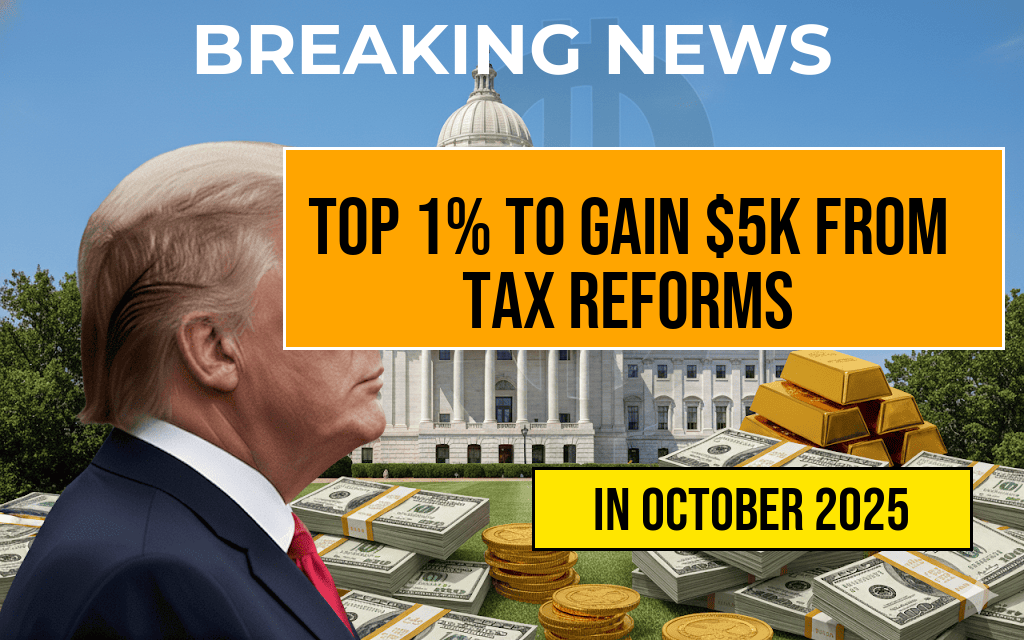Recent changes to the U.S. tax code are poised to significantly benefit the wealthiest Americans, particularly those in the top 1%. According to financial analyses, these high-net-worth individuals could see an average increase of approximately $5,000 in net income as a result of the new reforms. The adjustments, enacted through comprehensive tax legislation, aim to recalibrate the tax burden across income brackets but have been met with mixed reactions regarding their impact on economic inequality and government revenue. While policymakers argue that these reforms stimulate economic growth and provide necessary relief for high earners, critics contend they deepen the divide between the wealthy and the rest of the population.
Details of the Recent Tax Reforms
Key Provisions Favoring the Wealthiest
- Reduction in top income tax rates: The legislation lowered the top marginal income tax rate from 37% to 35%, directly benefiting high-income earners.
- Adjustment of capital gains taxes: The reforms increased the threshold for higher capital gains taxes, allowing wealthy investors to retain a larger share of investment earnings.
- Expansion of estate and gift tax exemptions: Higher exemption limits mean fewer estates are subject to estate taxes, preserving wealth across generations.
- Introduction of targeted tax credits: Certain deductions and credits have been expanded or introduced, disproportionately favoring high-income households with complex financial portfolios.
Impact on Net Income and Wealth Distribution
| Income Bracket | Average Increase in Net Income | Percentage Change |
|---|---|---|
| $1 million and above | $5,200 | 1.2% |
| $5 million and above | $5,200 | 0.8% |
The data indicates that the highest earners, particularly those with income exceeding $1 million annually, are expected to see the most substantial net income boost. This increase predominantly stems from lower tax rates on capital gains and dividends, which constitute a significant portion of the income for the ultra-wealthy.
Reactions from Economic Experts and Politicians
Supporters’ Perspective
Proponents argue that these reforms foster a more competitive environment for entrepreneurs and investors, encouraging economic expansion. They highlight that reducing marginal rates and easing estate taxes can incentivize wealth creation and job growth. Tax policy experts contend that such measures can lead to increased capital investment, which may benefit broader segments of the economy over time.
Critics’ Concerns
Opponents raise concerns about widening income inequality and decreasing government revenue. They point out that the wealthiest Americans are already disproportionately advantaged, and further tax cuts could exacerbate disparities. Critics also warn that reduced revenue may lead to cuts in public services or increased deficits, potentially burdening middle- and lower-income households. Forbes reports that some experts predict the net income gains for high earners could be offset by increased taxes elsewhere, such as payroll taxes or state levies.
Implications for Federal Revenue and Policy Debate
Projected Revenue Changes
- Short-term increase in individual income tax collections: Due to higher incomes in the top brackets.
- Long-term revenue outlook: Uncertain, as behavioral responses—such as tax avoidance or income shifting—may mitigate gains.
- Potential for deficit impact: Experts caution that reduced tax rates could slow revenue growth unless offset by economic expansion or increased compliance efforts.
Broader Economic and Political Context
The reforms come amid ongoing debates over tax fairness and fiscal responsibility. While some policymakers emphasize the importance of maintaining incentives for wealth creation, others stress the need for a more equitable system that funds public services and reduces inequality. The debate continues to influence legislative priorities and future reform proposals.
Conclusion
The recent tax legislation marks a significant shift in the tax landscape for America’s wealthiest citizens. While beneficiaries can anticipate an average net income increase of around $5,000, the broader implications for economic inequality and federal revenue remain subjects of active discussion. As the effects unfold over the coming months, policymakers, economists, and the public will closely monitor how these changes influence income distribution and government finances.
Frequently Asked Questions
Who are the wealthiest Americans affected by recent tax reforms?
The wealthiest Americans in the Top 1% are the primary beneficiaries of the recent tax reforms, with many set to gain around $5,000 in net income.
How much additional net income can the top 1% expect to gain from the tax reforms?
According to recent analyses, members of the Top 1% can expect to see an average increase of approximately $5,000 in net income due to the new tax policies.
What specific tax reforms are contributing to these income gains?
The recent tax reforms include adjustments such as lower tax rates for high-income brackets and increased deductions, which collectively boost the net income of the wealthiest Americans.
Are the benefits from the tax reforms evenly distributed among high-income earners?
No, the benefits are more significant for those in the Top 1%, with the data indicating an average $5,000 increase in net income, while other income groups see lesser or no gains.
What are the implications of these tax reforms for income inequality?
The tax reforms are likely to widen the income gap, as the wealthiest Americans receive larger net income boosts, potentially impacting discussions on income inequality and economic policy.

Leave a Reply